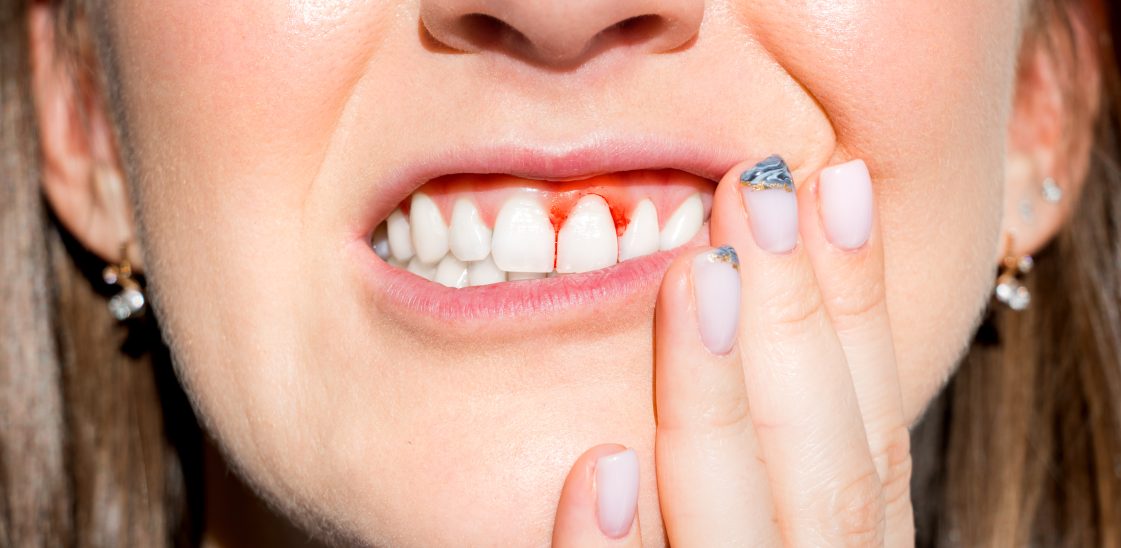
Why are my gums bleeding?
Noticing blood when you brush or floss your teeth can be alarming, but bleeding gums are a common issue with various causes, from gum disease to dental injury.[1] In this article, we go through why your gums might be bleeding and how you can treat it.
What causes bleeding gums?
Bleeding gums can result from several factors, ranging from poor oral hygiene to underlying health conditions. It’s therefore advisable to seek medical advice from a healthcare professional if you do experience bleeding gums.
Some of the most common causes of bleeding gums include gum infection, pregnancy, dental injuries and mouth ulcers.[1] Below we explore each of these causes in detail.
Gum disease
One of the most common causes of bleeding gums is gum disease which is caused by plaque building up on your teeth and irritating your gums.[2] Gingivitis is the earliest stage of gum disease and includes the following symptoms:
- Bleeding gums when you clean your teeth
- Red or swollen gums
- Occasional bad breath.
At this stage, if you remove the plaque and maintain good oral hygiene, the gingivitis will likely get better on its own.[3] These preventative measures you can take include:
- Brushing your teeth twice a day for a full two minutes
- Using a fluoride toothpaste
- Spitting after brushing but not rinsing
- Cleaning in between your teeth everyday with floss, floss picks or interdental brushes
- Replacing your toothbrush every one to three months
- Having regular check ups with your dentist.[2]
If you do have signs of gum disease, it’s important to use products that can remove food and plaque without irritating sensitive gums. For example, Dentek Eco Sensitive Floss Picks features a silky soft ribbon designed to gently massage the gums to ease discomfort.
Pregnancy
As well as obvious changes to your body, cravings and sickness, pregnancy can impact your oral health. When you’re pregnant, your body produces more of a hormone known as progesterone which increases blood supply to the mouth. This can make your gums more sensitive to bacteria and prone to bleeding, meaning many pregnant people get what’s known as pregnancy gingivitis.[4]
Although pregnancy gingivitis is typically temporary and should go away when the baby is born, it’s important to maintain good oral hygiene to prevent it from worsening. For this, the advice is the same as for general gum disease and you can always contact your dentist if you have any concerns.[4]
Dental injury
Another reason why you may be experiencing bleeding gums is a dental injury where you experience cuts to your gum. This could be due to a more serious injury, for example if you have a nasty fall or are involved in a car accident. However, you can also get cuts between your teeth that are likely to be because:
- You’re not flossing correctly
- You’re using a hard-bristled toothbrush
- You’re using sharp objects such as toothpicks with too much force.
A bleeding cut to the gum will likely be accompanied with pain in that area, as well as potential swelling. Most cases of cuts to the gum are mild enough to treat at home by stopping the bleeding with a clean cloth and doing a salt rinse to reduce risk of infection.[5]
Using a soft-bristled toothbrush can help to prevent cuts on your gum. It’s also worth considering what you use to clean between your teeth. Interdental brushes designed to access tight spaces, such as the Dentek Eco Slim Brush, can remove plaque effectively without irritating the gum due to their slimline, easy-to-handle design.
Mouth ulcers
Mouth ulcers are small, painful patches or lumps in your mouth which can be caused by a number of things including:
- Biting the inside of your cheek
- Burning your mouth when eating or drinking
- A food allergy or intolerance
- Feeling tired or stressed
- Damaging your gums with your toothbrush
- Poorly fitted dentures, braces, rough fillings or a sharp tooth
- Hormonal changes, e.g. during pregnancy
- A vitamin deficiency.
As a result of this, you may experience irritation and bleeding in your gum. Mouth ulcers are common and should clear up within a couple of weeks but you should contact your doctor if it lasts more than three weeks. [6]
Resources:
[1] – https://medlineplus.gov/ency/article/003062.htm
[2] – https://www.nhs.uk/conditions/gum-disease/
[3] – https://www.nidcr.nih.gov/health-info/oral-hygiene




